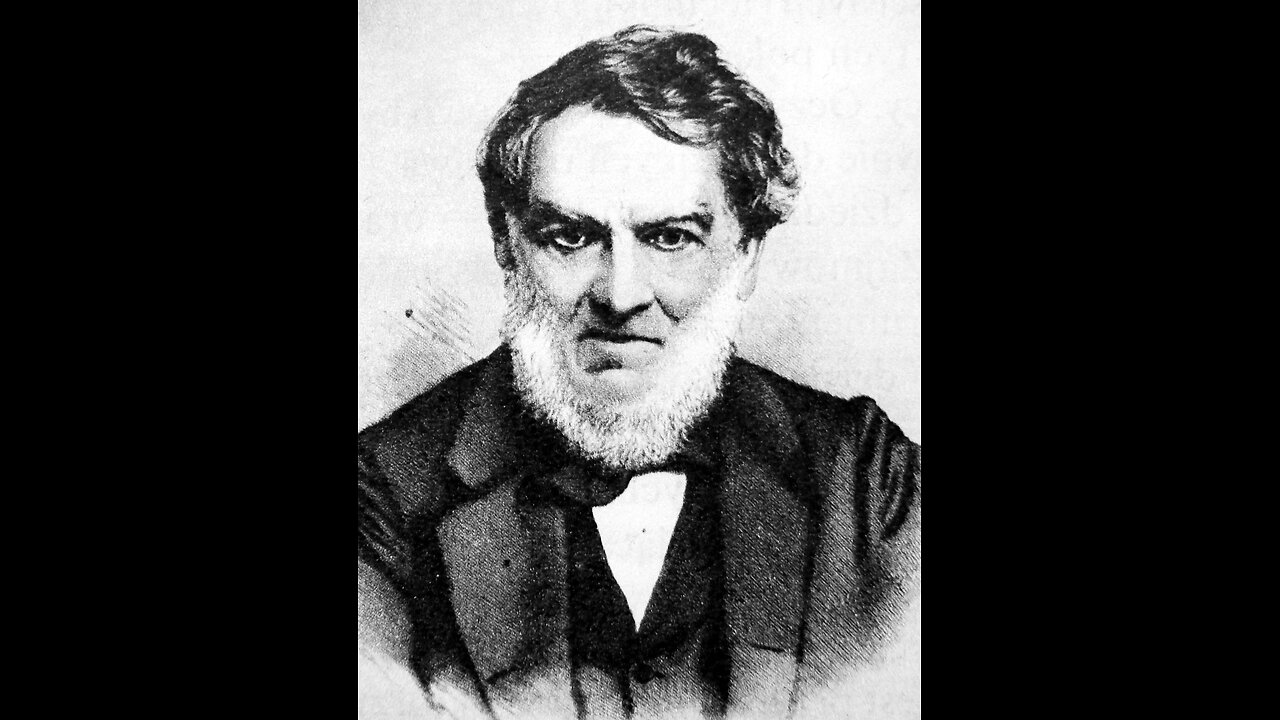Premium Only Content

Polish Genius : Jan Jozef Baranowski
Jan Józef Baranowski (born September 7, 1805 in Śmiłowicz[1], died March 30, 1888 in London) - Polish economist and financier, nobleman, linguist, engineer and inventor from the Great Emigration[2]. He was the author of inventions in the fields of railways, communications, accounting and calculating machines, including: semaphore, ticket validator and gas meter. Jan Józef Baranowski was born in Śmiłowicz in the then Ihumen County in the Minsk region from the union of a Polish nobleman of the Grzymała coat of arms, Marcin Baranowski, and Maryanna née Szalkiewicz[5].
He began his education in a noblemen's boarding school run by missionary priests from the monastery in Śmiłowicze, and continued at the classical gymnasium in Minsk. In the years 1821–1825 he studied at the Faculty of Mathematics and Physics of the University of Vilnius, and in the years 1825–1828 at the Law Faculty of this university, obtaining the degree of candidate. Immediately after graduating, he was employed in the foreign correspondence office of the Bank of Poland. He participated as a volunteer in the November Uprising. Initially, he served in the Gid Corps, and then in the 5th Uhlan Regiment. The unit in which he fought was part of the forces of General Girolam Ramorin and at the end of the uprising he withdrew to Austria[6][4], where he was interned.
From 1832, Baranowski lived in exile in France - in Gray, Lyon and Chalon-sur-Saône, where he worked as a banker and salesman in department stores. In 1837 he moved to Paris, taking a job as a cashier in the Jelski, Dussard et Compagne bank. In the years 1843–1848 he worked as an accounting inspector of the Paris–Rouen–Le Havre railway. The accounting system he developed for this company was highly appreciated and was also implemented by other French railway companies. After 1848, he resigned from his job and devoted himself entirely to inventive activity[6][4].
In 1871, after the end of the Franco-Prussian War, France was obliged to pay a high contribution. Baranowski presented the authorities with a government loan plan that made this possible. He did not receive any reward for his proposal, which made him discouraged from France and in 1872 he left for London. There he took up the job of assistant secretary of the Literary Society of Friends of Poland (connected with the Hôtel Lambert camp) and was responsible for, among others, developing dictionaries. He was a polyglot who, in addition to Polish, also knew German, French and English[5]. In 1880 he developed, among others: The Student's Anglo-Polish Grammar is a textbook for learning Polish for English speakers. He was the author of many technical inventions, 17 of which were patented in France. His inventions include:
gas meter,
manual ticket validator - the principle of operation and construction of the device was similar to those used today, for this invention Baranowski received the medal of the French Minister of Public Works in 1849 at the National Exhibition in Paris and the medal of the French Society for the Encouragement of Invention,
ticket printing and control machine – enabling ticket printing at a rate of 5,000. per hour. She was awarded in 1851 at the Universal Exhibition in London,
Semaphore, i.e. an automatic railway signaling system - Baranowski's invention from 1857 was first practically used on the Paris-Rouen line, and in November that year on the Paris-St Germain line[6]. The Baranowski system was also introduced a year later in Italy on the Genoa-Turin railway line and, after modernization, on the Paris-Brussels line. It was presented in 1862 at the World Exhibition in London [3] and was later also used in England.
an accounting machine used to control accounts (tax machine) - in 1849, at the national exhibition in Paris, the inventor received a medal for this invention from the French Society for the Encouragement of Invention,
letter copying device,
a voting machine invented in 1848, patented a year later[7], used to count votes.
-
 54:30
54:30
BonginoReport
4 hours agoLeft Demands Return of MS-13 Gang Member - BR Early Edition w/ Evita (Ep.182) - 04/15/2025
32.4K63 -
![🔴[LIVE] MASSIVE Swings Incoming! || The MK Show](https://1a-1791.com/video/fww1/71/s8/1/F/s/c/C/FscCy.0kob-small-The-MK-Show-Apr.-15th.jpg) LIVE
LIVE
Matt Kohrs
13 hours ago🔴[LIVE] MASSIVE Swings Incoming! || The MK Show
1,494 watching -
 LIVE
LIVE
Badlands Media
4 hours agoBadlands Daily: April 15, 2025
4,619 watching -
 LIVE
LIVE
Wendy Bell Radio
5 hours agoLiberals Love Criminal Illegals More Than They Love America
9,372 watching -
 1:15:29
1:15:29
Dear America
14 hours agoAustin Metcalf Killer RELEASED, JD Vance Fumbles CFP Trophy + CNN Gets Bullied In The Oval Office!
34.9K11 -
 LIVE
LIVE
Major League Fishing
23 hours agoLIVE Tackle Warehouse Invitationals, Stop 3, Day 1
892 watching -
 LIVE
LIVE
2 MIKES LIVE
1 hour agoTHE MIKE SCHWARTZ SHOW with DR. MICHAEL J SCHWARTZ 04-15-2025
191 watching -
 1:19:29
1:19:29
Game On!
14 hours ago $4.56 earned8,000 Subscriber Celebration Stream!
22.2K1 -
 28:30
28:30
Degenerate Jay
16 hours ago $3.99 earnedThe Rejected 007 Quantum Of Solace Ending That Would Have Changed James Bond
33.5K6 -
 11:37
11:37
ARFCOM Reviews
15 hours ago $2.03 earnedNew Budget Comp'd Carry || Canik MC9 PRIME
41.1K4